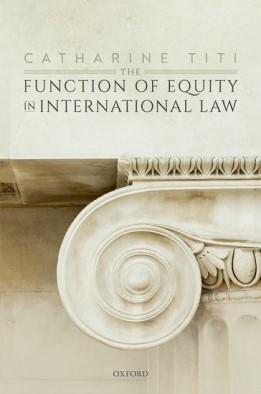
This book provides a systematic and comprehensive study of the legal concept of equity as it operates in contemporary international law. A principle with a long pedigree, equity has been present in legal thought and in municipal legal systems since antiquity. Introduced in international legal decisions through claims commissions and arbitral tribunals, equity became progressively part and parcel of the international law mainstream. From international cultural heritage law to the law on climate change, from maritime boundary delimitations to decisions on security for costs in investment arbitration, the relevance of equity is more far-reaching than has previously been acknowledged. In contrast with earlier studies on the topic, this book is informed by a body of judicial and arbitral case law that has never been so substantial and varied. It also draws extensively on the prolific case law of investment tribunals, gaining insights from a valuable source that is typically overlooked in public international law scholarship. As the importance of international law increases, covering continuously new domains, the value of equity increases with it. It is this new equity in the international law of the 21st century that this book explores.